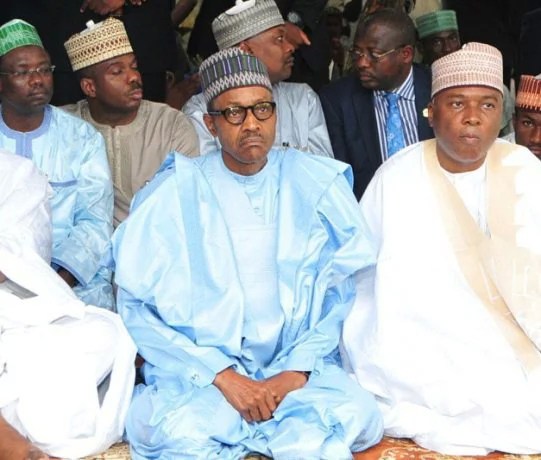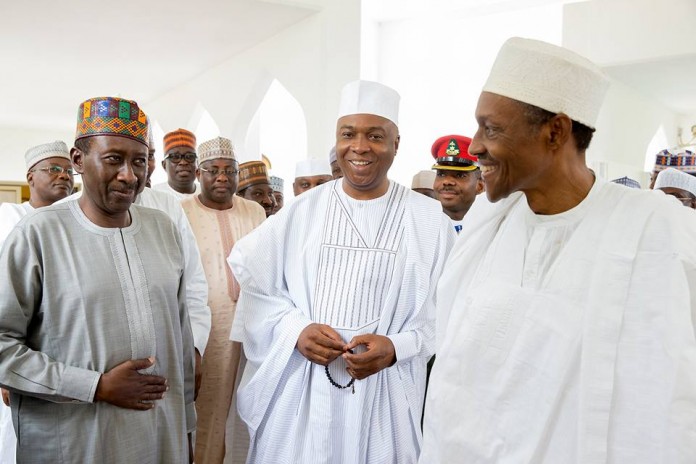The relationship between Nigeria’s President, Muhammadu Buhari and Bukola Saraki, the country’s Senate President appear to have shifted from the phase of winner or loser to the win-win phase. Unlike the stone face that characterized the first time that Bukola prayed with the president publicly last year, it was all smiles and a rather relaxed Buhari three days ago when they met again. The Senate President appears to have broken the barriers into the Nigerian seat of power erected in the wake of his magical manoeuvre into the Senate Presidency in June last year to the chagrin of the APC. In fact, insiders say it left the party adrift, particularly as the manoeuvre was backed by a contingency plan that left the APC with no alternative to Bukola. If they got him impeached, the opposition PDP would take control of the Senate. Allowing the PDP to take over the leadership of the Senate is like reversing its disastrous performance in the 2015 presidential poll. So, the option of impeaching Bukola was dead on arrival.

President and Bukola @Prayers Last year.

As @ last Friday
In September 2015, he was hauled before the Code of Conduct Tribunal for alleged anticipatory declaration of assets when he was governor of Kwara State between 2003 and 2011, a move he described as fallout of his intervention against vice-presidential ambition of Bola Ahmed Tinubu, a chieftain of the APC. Although his wife has seemed to get along with the presidency, he himself has not seemed so until what appeared a thaw in relationship last Friday.
To the extent that Buhari is neither IBB nor Obasanjo who could eat your pounded yam or dance with your wife even when he already had a killer punch for you in his pocket, the photospeak of last Friday’s meeting between the two is a significant indication of where that relationship stands today. The question would be how it might be explained.
A strong possibility is that some forces and interests might have intervened. Some elders somewhere might have come in between the contending players and sued for peace. As a former governor of his home state, it would not be surprising if the Emir of Ilorin led the process, making the claim that hauling the ‘son of the soil’ before the tribunal was overstretching legalism. Of course, the emir is one of the most entrenched traditional authorities in Nigeria. The emir can reach out from Lagos to Sokoto, branching the Alafin, the Ooni, the Oba of Benin, among others, on his way to the Sultan.
A second possibility is that the regime advised itself against warring on too many fronts at the same time. Or it realises it is so alienated it can do with soft pedalling on a highly networked player such as Bukola.
A third possibility is a strategic reading of the Bukola potential in Nigerian politics. In other words, a section of the government might have argued that Bukola belongs to the category of individuals to be positioned for national cause because of the type of nation Nigeria is. Situations could arise in which he could add value to the stateness of the state because of his family, his own education cum exposure, (he has classmates outside the country), he straddles the northwest, north central and the south west and he has been governor, including chairperson of the governors’ forum. It means that in a fragile country such as Nigeria, a Bukola could be useful, particularly that he is not associated with any confused notion of restructuring. Whether Bukola himself is aware of these and has been using them for the good of the country is a different matter.
Analysts believe that Bukola would certainly not be the only such case and that all such individuals are being noted. That is all those with unique backgrounds that can serve national cause, those with critical constituencies, those with calming national effect, those who have made sacrifices for the nation where such sacrifice is not in pursuit of inordinate ambition, all witnesses of truth, all with exceptional performance in office and those with something material at stake that they would always push for stability, (Dangote and his factories all over the place as a perfect example).
If this was the situation that might have changed the president’s mind, then it is possible that Bukola might have been categorised as those to be severely warned and asked to go and sin no more. As these are behind the scene processes, the question of confirmation does not arise. Whichever explanation applies, it looks like a win – win solution at last. That should be a good development in view of the exasperating times and the need to avoid costly ego wars within the ranks of political leaders while the people groan in hunger and poverty.




























